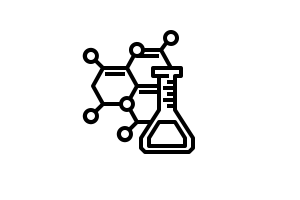Photochemical Reduction of Carbon Dioxide to Formic Acid using Ruthenium(II)-Based Catalysts and Visible Light
 publication
publication
| About |
|---|
|
This page about a publication or dataset does not currently include an investigation. Please add any experiments detailed in the publication or performed to obtain this dataset.
|
|
A molecule on this page has a mistake in its structure or is missing a part. Please edit the structure or redraw a new molecule using the replace molecule workflow.
|
Abstract
Summary
A photochemical reduction of CO2 to formic acid was shown using a system containing an iridium-based photosensitizer, ruthenium photocatalyst and triethanolamine as the electron donor. Turnover numbers up to 526 and a selectivity of 80% towards formic acid were observed if the reaction was performed with [Ir(ppy)2(bpy)]PF6 [Ir(ppy)2(bpy)][PF6] as the photosensitizer and [Ru(bpy)2(Cl)(CO)]PF6 as the catalyst. The experiments were conducted under irradiation with Hg-lamp equipped with a λ=400–700 nm filter.
Advances and special progress
The employed photocatalytic system showed activity for the photoreduction of Na2CO3 to formic acid as well. A TON of 53 was observed after 5h reaction time.
Additional remarks
Experiments using different electron and proton donors such as triethylamine (TEA) and 1-benzyl-1,4-dihydronicotinamide (BNAH) were unsuccessful as the observed activities were lower than those obtained in the presence of TEOA.
Content of the published article in detail
The article contains results for the reduction of CO2 to formic under visible-light catalysis using ruthenium complexes as catalysts, the iridium complex [Ir(ppy)2(bpy)]PF6 [Ir(ppy)2(bpy)][PF6] as a photosensitizer and triethanolamine as the electron donor. The catalytic system performs best (referring to the TON of HCOOH production) with [Ru(bpy)2(Cl)(CO)]PF6 as photocatalyst.
Catalysts

Ru(bpy)2CO3
[Ru(bpy)(H2O)(CO)][PF6]
[Ru(bpy)(AcMe)2][PF6]
Photosensitizer
Investigations
| cat | cat conc [µM] | PS | PS conc [mM] | e-D | solvent A | . | λexc [nm] | TON CO | TON H2 | TON HCOOH | . | |
|---|---|---|---|---|---|---|---|---|---|---|---|---|
| 1. | 0.025 | 0.025 | 400 - 700 | 1 | 2 | 13 | ||||||
| 2. | 0.025 | 0.025 | 400 - 700 | 2 | 4 | 21 | ||||||
| 3. | 0.025 | 0.025 | 400 - 700 | 13 | 8 | 62 | ||||||
| 4. | 0.025 | 0.025 | 400 - 700 | 8 | 8 | 34 | ||||||
| 5. | 0.025 | 0.025 | 400 - 700 | 7 | 9 | 40 | ||||||
| 6. | 0.025 | 0.025 | 400 - 700 | 3 | 4 | 27 |

| cat | cat conc [µM] | PS | PS conc [mM] | e-D | solvent A | . | λexc [nm] | TON CO | TON H2 | TON HCOOH | . | |
|---|---|---|---|---|---|---|---|---|---|---|---|---|
| 1. | 0.0062 | 0.025 | 400 - 700 | 3 | 9 | 26 | ||||||
| 2. | 0.0062 | 0.025 | 400 - 700 | 3 | 11 | 39 | ||||||
| 3. | 0.0062 | 0.025 | 400 - 700 | 19 | 19 | 117 | ||||||
| 4. | 0.0062 | 0.025 | 400 - 700 | 21 | 16 | 107 | ||||||
| 5. | 0.0062 | 0.025 | 400 - 700 | 21 | 14 | 75 | ||||||
| 6. | 0.0062 | 0.025 | 400 - 700 | 4 | 12 | 64 | ||||||
| 7. | 0.0031 | 0.025 | 400 - 700 | 36 | 33 | 296 | ||||||
| 8. | 0.0031 | 0.025 | 400 - 700 | 16 | 29 | 145 | ||||||
| 9. | 0.0031 | 0.025 | 400 - 700 | 34 | 28 | 211 | ||||||
| 10. | 0.0016 | 0.025 | 400 - 700 | 40 | 67 | 419 | ||||||
| 11. | 0.0016 | 0.025 | 400 - 700 | 25 | 62 | 225 | ||||||
| 12. | 0.0016 | 0.025 | 400 - 700 | 45 | 65 | 335 | ||||||
| 13. | 0.0016 | 0.025 | 400 - 700 | 4 | 44 | 75 |

| analyte | E1/2 [eV] | solvent | electrolyte | . | . | WE | . | . | RE | . | |
|---|---|---|---|---|---|---|---|---|---|---|---|
| 1. | 0, -2.11; | glassy carbon | Ag/AgNO3 in MeCN | ||||||||
| 2. | 0.45, -1.97; | glassy carbon | Ag/AgNO3 in MeCN | ||||||||
| 3. | 1.22, -1.75; | glassy carbon | Ag/AgNO3 in MeCN | ||||||||
| 4. | 1.2, -1.61; | glassy carbon | Ag/AgNO3 in MeCN |

Sacrificial electron donor
In this study, the experiments were done with the sacrificial electron donor TEOA (100507).
Additives
No additives were used in the described experiments.
Investigations
- Table 1 (Molecular process, Photocatalytic CO2 conversion experiments)
- Table 2 (Molecular process, Photocatalytic CO2 conversion experiments)
- Optimization of concentrations (Molecular process, Photocatalytic CO2 conversion experiments)
- CO2 reduction experiments (Molecular process, Photocatalytic CO2 conversion experiments)

